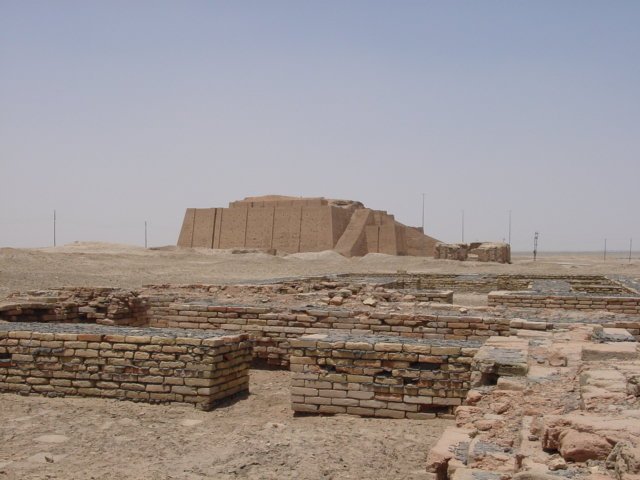Tongues of Fire
The ziggurat of Ur, Iraq.
It was hot. Really hot. Instead of cooling us, the wind brought more searing heat and stinging sand as we marveled at the ancient city of Ur, nestled in the Iraqi desert. But the heat and wind could not stop us from exploring the immense stone ruins, for we were on a pilgrimage to the roots of our faith. Iraq is the traditional land of the Garden of Eden. Here was Babel, and its infamous tower. This is the land bordered by the Tigris and Euphrates, ancient Mesopotamia and Sumer. Here nomadic humanity began to put down its roots, and what we call civilization was born. And here at Ur, Abraham was born. The book of Genesis tells us that Abraham’s family went from Ur to Haran, near the border of Syria and Turkey. There, God spoke to Abraham and sent him to Shechem, now the site of the city of Nablus, about an hour away from our home in Zababdeh. We had symbolically traced the steps of Abraham in reverse as we attended the Fifth Annual Christian Conference hosted by the churches of Iraq.
Standing at Ur, we gratefully braved the heat and winds and pondered the richness that came of its child Abraham, father of Isaac and Ishmael, the great Patriarch of Islam, Judaism, and Christianity. Today, Iraq is home to a rich variety of traditions springing from these faiths. For example, there are Shia’ and Sunni Muslims, Yezidis (a small group who believe that the fallen angel Lucifer must be appeased so he might reassume his place in heaven), Sabeans (who are followers of John the Baptist). But, even after months of ecumenical work with different Christian denominations in Palestine, we were unprepared for the richness of the Chistian community in Iraq (5% of the population, with more in the diaspora). We met Catholic, Orthodox, and Protestant - Greek, Roman, Chaldean, Adventist, Syrian, and Assyrian Christians. Pondering this experience, braced in the hot wind, we felt like we were experiencing our own Pentecost.
Pentecost is celebrated 50 days after Easter, among Christians in remembrance of when the Holy Spirit, in a loud rush of wind, descended upon the believers as divided tongues of fire, giving each person the ability to speak in other languages. Acts 2 says: “Now there were devout Jews from every nation under heaven living in Jerusalem. And at this sound the crowd gathered and was bewildered, because each one heard them speaking in the native language of each. Amazed and astonished, they asked…‘How is it that we hear, each of us, in our own native language? Parthians, Medes, Elamites, and residents of Mesopotamia, Judea, and Cappadocia, Pontus and Asia, Phrygia and Pamphilia, Egypt and the parts of Libya belonging to Cyrene, and visitors from Rome, both Jews and proselytes, Cretans and Arabs—in our own language we hear God’s deeds of power.’” As Peter spoke to the crowd, they were “cut to the heart and said to Peter, ‘what should we do?’ Peter said to them, ‘Repent.’”
Marthame offering prayers at one of the Presbyterian churches in Iraq.
Like the crowd in Jerusalem, we were amazed and astonished not only by the number of traditions represented, but even more moved to find people of our own tradition. No, there was not an English-speaking community (although we found that, as in Palestine, people in Iraq invariably speak better English than we speak Arabic). But rather, we had the blessed opportunity to visit five Presbyterian churches in Iraq.
And like that first Pentecost, the rich variety of Christian voices we heard in Iraq spoke in one voice, proclaiming God’s deeds of power and one faith in Jesus Christ. These voices shared the witness of a church very much the minority, but treated with tolerance and acceptance by the rest of the culture. And they called with one voice to their brothers and sisters in Christ who had come to be with them (also something of a Pentecost gathering, from Dutch Calvinists to Lebanese Maronites), asking us to call for an end to the shameful sanctions. They ask us to pray for them, living in the grip of near total economic shut-down. Sanctions have deprived an innocent population of a way of life, of proper nutrition, of basic medical care, of hope for a future. And while these sanctions have curtailed the strength of the military, at the same time they make their President more powerful than ever.
As the crowd was cut to the quick by Peter’s exhortation, we felt called to repentance by our visit to Iraq. How had we been so unaware of the Christian community of Iraq? Of our own Presbyterian brothers and sisters, whose church had first been established by American Presbyterian missionaries 150 years ago? How could we be so blind to realities of our government’s policies, which – no matter our opinion of Saddam Hussein – have created a grim present and hopeless future for so many people, including our brothers and sisters in Christ? How could we not realize that the demonized nation of Iraq is truly the proud cradle of so much we hold dear?
We came seeking the wisdom of our patriarch out in the blazing desert sun, but we came away with our tongues ablaze, burning with the desire to add our voices to the beautiful Pentecostal voices.
We greet you in Salaam-Shalom-Shlam-Peace,
Elizabeth and Marthame


